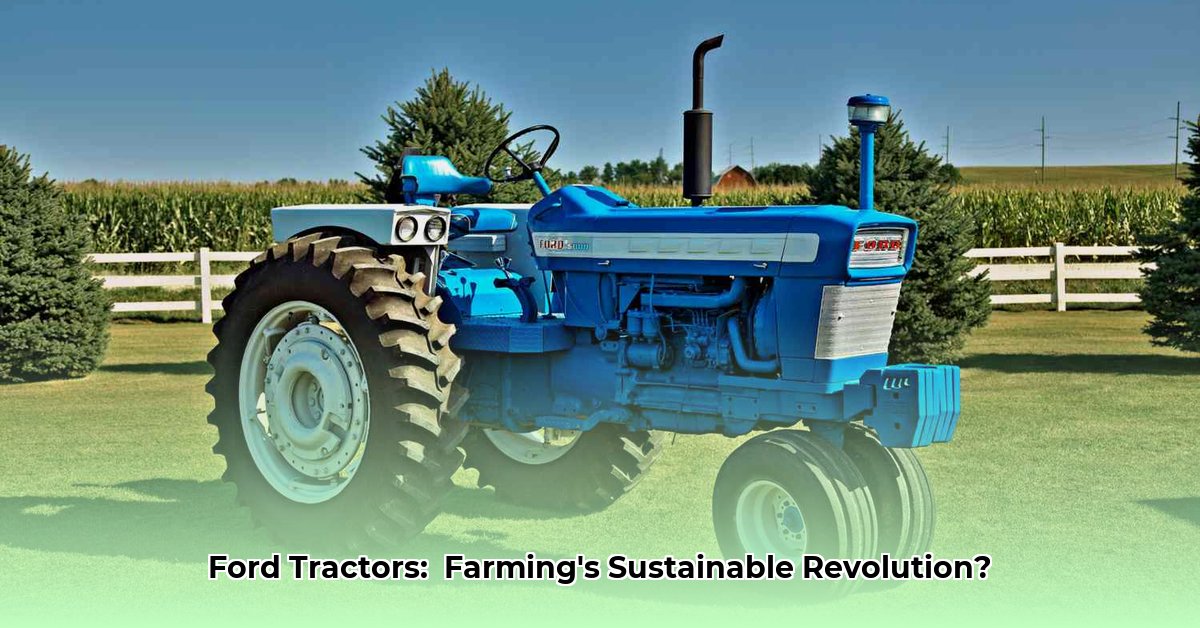
The iconic image of a Ford tractor—a symbol of agricultural mechanization—tells a complex story. It's a narrative of progress intertwined with unintended consequences, a legacy that continues to shape sustainable agriculture today. This article explores the Ford tractor's historical impact, its environmental footprint, and how its legacy informs modern sustainable farming practices. We'll examine how the mechanization of farming, while initially boosting food production, also introduced new environmental challenges and how we can navigate these challenges today. For more on Ford tractor history, see these vintage Ford toys.
The Iron Horse and the Green Revolution: A Double-Edged Plow
Before the widespread adoption of the Ford tractor, farming was labor-intensive, reliant on human and animal power. The introduction of the Fordson tractor in the early 20th century revolutionized agriculture, enabling farmers to cultivate larger areas and significantly increase crop yields. This mechanization played a crucial role in feeding a rapidly growing global population. However, this increased efficiency came at a cost. Higher yields often led to a dependence on chemical fertilizers and pesticides, which, while boosting production, negatively impacted soil health, water quality, and air quality. While early photographs depict increased efficiency, they fail to capture the hidden environmental cost—the genesis of many of today's environmental concerns. How could we have foreseen this impact?
Environmental Concerns: The Footprint of Progress
Early Ford tractors were far from environmentally friendly. Their gasoline engines generated substantial carbon emissions, a factor largely overlooked at the time. The expansion of mechanized farming also resulted in habitat loss due to land clearing for agriculture, contributing to soil erosion and degradation. Although modern tractors are far more fuel-efficient, the environmental legacy of early mechanization continues to impact sustainable agriculture today. This raises important questions: How can we reconcile efficient food production with environmental protection? What long-term implications must we consider from past technological advancements? The sheer number of Ford tractor images online bears witness to its transformative—and problematic—influence.
Sustainable Farming: Learning from History's Mistakes
The Ford tractor's story highlights that technological progress isn't inherently sustainable. True sustainability requires a holistic approach, incorporating technology intelligently to minimize environmental damage. This involves several key strategies:
Precision Agriculture: Utilizing GPS, sensors, and data analytics to optimize resource use (water, fertilizer, pesticides), minimizing waste and environmental impact. Precision agriculture represents a significant advancement in sustainable farming techniques.
Renewable Energy Sources: Transitioning from fossil fuels to renewable energy sources like solar power and biofuels for tractor operation. This reduces greenhouse gas emissions and dependence on finite resources. The shift to renewable energy is crucial for long-term sustainability in agriculture.
Sustainable Soil Management Practices: Implementing methods such as crop rotation, cover cropping, and no-till farming to enhance soil health, biodiversity, and water conservation. These practices are vital for maintaining the long-term productivity of agricultural land.
These strategies offer a path toward a more sustainable future, addressing the limitations of early agricultural mechanization.
The Future of Farming: Combining Progress and Preservation
The countless images of Ford tractors represent a pivotal moment in agricultural history. They highlight human innovation but also underscore our environmental responsibility. The journey towards sustainable agriculture requires continuous adaptation and innovation. It necessitates a shift from solely maximizing yields to considering the overall environmental impact of farming practices. The future of farming depends on learning from past mistakes, integrating those lessons into modern techniques, and developing agricultural machinery that maximizes efficiency while minimizing environmental harm. This is a vital challenge we must face for the sake of the planet and future generations.
How to Reduce Environmental Impact of Farming Equipment Replacement
The agricultural sector is undergoing a transition, with a growing emphasis on sustainable equipment replacement. The lifespan and eventual disposal of farm machinery, particularly tractors, significantly impact the environment.
The Ford Tractor's Enduring Legacy
The Fordson tractor's introduction democratized mechanized agriculture, leading to increased efficiency but also heightened fuel consumption and environmental consequences. This historical context is crucial for understanding modern sustainability challenges.
Modern Tractors and Sustainability
While today's tractors incorporate advanced technologies aimed at sustainability (biofuels, precision agriculture, efficiency improvements), replacing older equipment remains an environmental concern.
Strategies for Sustainable Tractor Replacement
To mitigate the environmental impact of tractor replacement:
Extend Tractor Lifespan: Implementing regular maintenance and timely repairs extends equipment life, reducing the frequency of replacements.
Choose Efficient Models: Selecting fuel-efficient models with reduced emissions lowers the environmental footprint. Modern advancements in engine technology are key here.
Embrace Precision Agriculture: Utilizing precision agriculture technologies minimizes resource use, contributing to sustainability.
Explore Sustainable Fuels: Transitioning to biodiesel and other renewable fuels reduces reliance on fossil fuels.
Responsible Disposal: Implementing proper disposal and recycling programs minimizes environmental harm at the end of a tractor's lifespan.
Utilize Government Incentives: Exploring government incentives for sustainable agricultural practices can further support environmentally conscious choices.
These strategies contribute to a more sustainable approach to farming equipment management, balancing progress with environmental responsibility. The legacy of the Ford tractor serves as a potent reminder of the need for responsible innovation in agriculture.